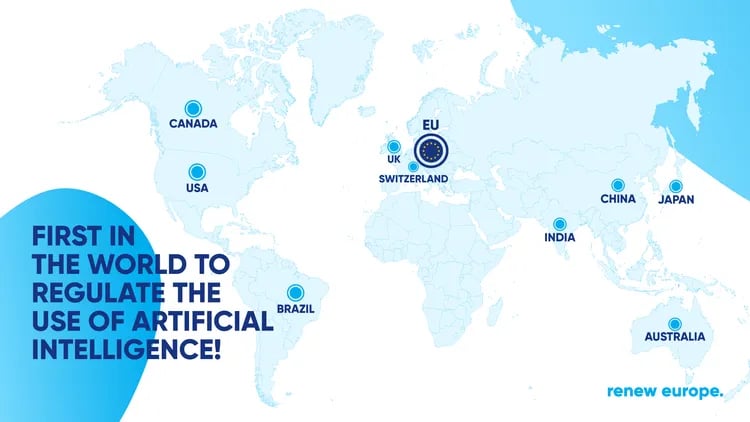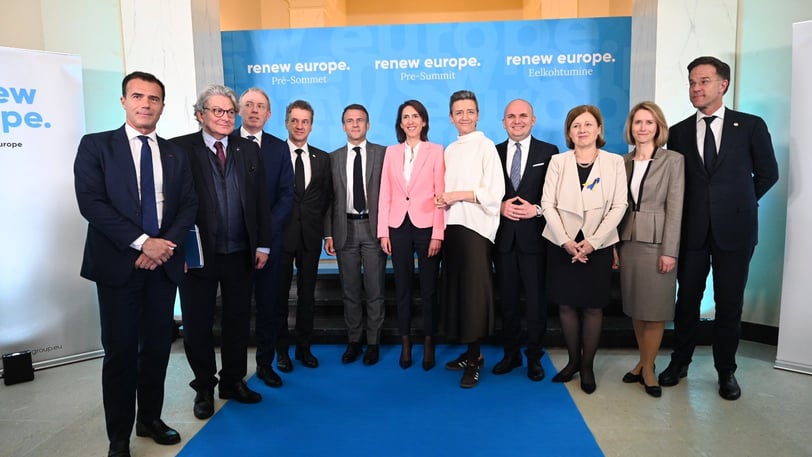

Renew Europe: reneweuropegroup.eu
The European Union (EU) has taken significant strides in regulating artificial intelligence (AI) to ensure that technological advancements are both innovative and ethical. At the forefront of these efforts is Renew Europe, the liberal political group in the European Parliament, which has been instrumental in shaping AI legislation that aligns with liberal values.
At Vote Liberals PH (voteliberals.com), our mission is to publish content about Liberal Parties overseas, highlighting key personalities, party activities, and their policy advocacies. Understanding liberal victories in the EU's AI legislation is relevant for Filipinos as it highlights how liberal principles can drive ethical technological progress, seeing to it that AI benefits society while protecting individual freedoms. These insights can inspire similar initiatives and policy considerations in the Philippines.
The newly enacted AI Act is a landmark piece of legislation, positioning the EU as a global leader in AI governance. This legislation focuses on creating a balanced framework that supports innovation while safeguarding fundamental rights and ethical standards.
In this article, we will explore seven key victories championed by Renew Europe and other liberal groups in the EU's AI legislation, highlighting how these measures promote a fair, transparent, and competitive AI landscape.
1. Human-Centric AI Framework
A central pillar of the AI Act, strongly advocated by Renew Europe, is the establishment of a human-centric AI framework. This approach ensures that AI technologies are developed and utilized in ways that prioritize human welfare and fundamental rights.
According to Renew Europe's position paper, the goal is to create AI systems that are ethical, transparent, and accountable, preventing misuse and protecting individual privacy. This framework addresses the potential risks associated with AI by implementing strict guidelines and ethical standards that developers must adhere to.
By focusing on human-centric AI, the EU aims to make AI a benefit to society as a whole, enhancing quality of life without compromising personal freedoms or privacy. This victory highlights the importance of aligning technological progress with human values, aspiring for AI to serve as a tool for positive social change rather than a source of exploitation or harm.
2. Prohibition of Biometric Surveillance
One of the most significant liberal victories in the AI Act is the prohibition of biometric surveillance technologies, such as facial recognition, in public spaces. This ban represents a crucial step in protecting citizens' privacy and preventing unwarranted surveillance.
By restricting the use of these technologies, the EU addresses concerns about potential abuses and the erosion of civil liberties. The legislation specifically targets practices that could lead to mass surveillance, aiming for AI deployment in a manner that respects individual rights and freedoms.
This move not only safeguards privacy but also sets a precedent for other regions considering similar regulations. It demonstrates a commitment to ethical AI practices, promoting trust and accountability in the development and use of AI technologies.


3. Support for SMEs and Startups
A key aspect of the AI Act, championed by Renew Europe, is its robust support for small and medium-sized enterprises (SMEs) and startups. Recognizing the critical role these entities play in driving innovation, the legislation includes provisions for regulatory sandboxes and increased access to financial resources.
Regulatory sandboxes provide a controlled environment where SMEs and start-ups can test new AI technologies under the supervision of regulatory bodies, reducing the risk associated with innovation while ensuring compliance with legal standards.
Additionally, the AI Act aims to streamline access to funding and resources, helping these smaller entities overcome financial barriers that often hinder technological advancements.
By fostering a supportive ecosystem, the EU is paving the way for diverse and innovative contributions to the AI landscape, allowing new players to thrive and compete on a global stage. This approach not only boosts economic growth but also encourages a more dynamic and inclusive AI development environment.
4. Transparency, Accountability, and Ethical AI
A crucial victory in the EU's AI legislation is the emphasis on transparency, accountability, and the promotion of ethical AI. European liberals have strongly advocated for measures requiring AI systems, especially high-risk ones, to be transparent about their operations. This includes obligations for companies to provide clear information about how their AI systems function, the data they use, and the decisions they make. Such transparency is vital in building trust between AI developers and the public, helping individuals understand how AI impacts their lives, and allowing them to hold entities accountable for AI-driven actions.
The AI Act mandates detailed documentation and logs for AI operations, aiding regulators in monitoring compliance with ethical guidelines and legal standards. Additionally, impact assessments for high-risk AI systems evaluate potential effects on fundamental rights, guiding developers to mitigate adverse impacts. By mandating rigorous ethical standards and encouraging the establishment of independent oversight bodies, the EU aims to foster a trustworthy and ethical AI ecosystem, setting a benchmark for other regions to follow.
This approach ensures AI technologies are developed and utilized in ways that respect human rights and societal values, prevent discrimination and biases in AI applications, and promote equitable outcomes across various sectors.
5. Strategic Investments in AI Research
Another significant victory in the EU's AI legislation is the strategic focus on investing in AI research and development. This initiative, championed by Renew Europe, aims to solidify the EU's position as a leader in AI innovation. By allocating substantial funds and resources towards AI research, the legislation seeks to foster groundbreaking advancements and maintain the EU’s competitive edge in the global AI market.
One key aspect of this strategy is the establishment of AI research centers and collaborative platforms that bring together academia, industry, and government. These centers are designed to facilitate knowledge sharing and accelerate the development of innovative AI solutions. Additionally, the legislation supports the creation of regulatory sandboxes, where new AI technologies can be tested in a controlled environment, promoting safe and responsible innovation.
Furthermore, the AI Act encourages public-private partnerships to drive forward AI research. By leveraging the strengths of both sectors, these partnerships aim to address complex challenges and deliver impactful AI applications across various industries, including healthcare, transportation, and environmental sustainability.
6. AI for Public Good
The EU's AI legislation emphasizes the use of AI for the public good, a principle strongly supported by Renew Europe. The legislation encourages leveraging AI to tackle significant societal challenges such as healthcare, climate change, and public safety. For instance, AI-driven innovations in healthcare can lead to improved diagnostics and personalized treatments, while AI applications in environmental monitoring can enhance efforts to combat climate change.
In addition, the legislation promotes developing AI systems that support public sector efficiency and transparency. This includes using AI to streamline government services, enhance public transportation, and improve disaster response mechanisms.


